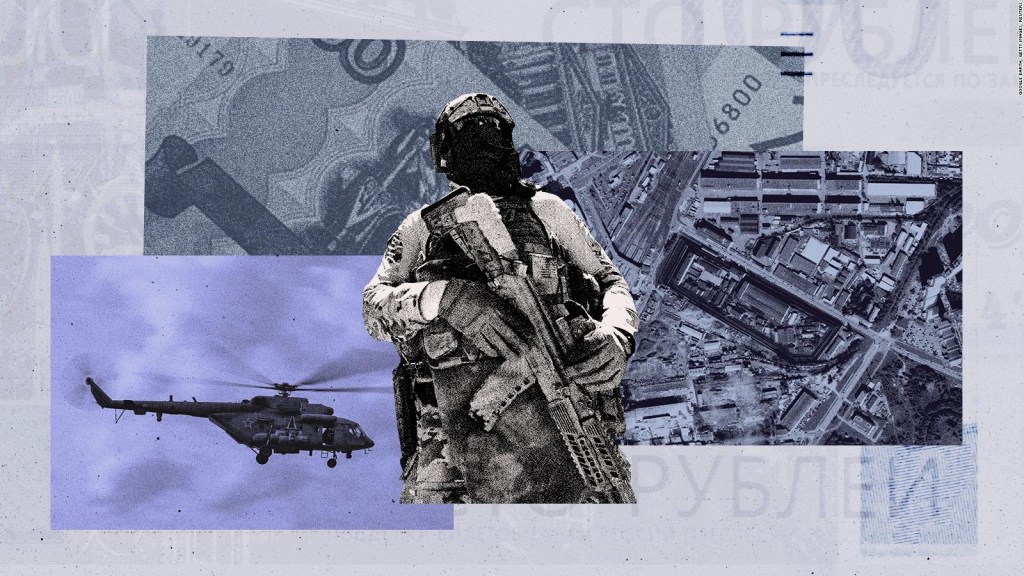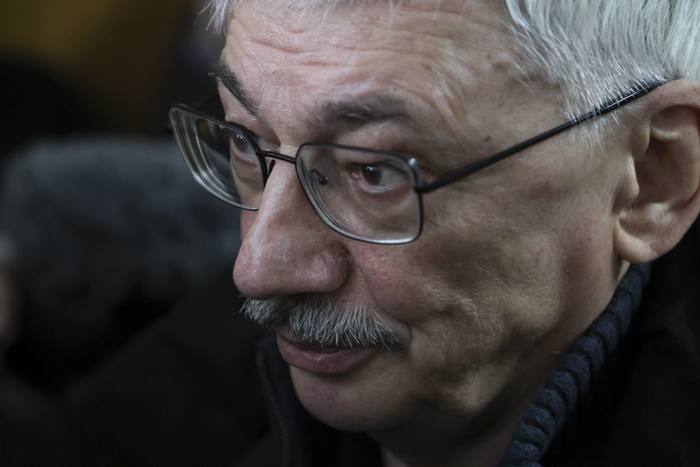Ukrainian ex-POWs denounce abuses 2:28
(CNN) --
Promises of freedom and wealth reach inmates in the overcrowded cells of Russian prisons.
Frantic phone calls ensue between relatives and inmates considering the offer.
Then the prisoners disappear, leaving their loved ones to search through the reports of the wounded arriving at the hospitals.
This scene is repeated in convict communities throughout Russia.
With a regular army depleted after nearly six months of a bloody and disastrous invasion of Ukraine, there is mounting evidence that the Kremlin is making horrible decisions in its terrible war and recruiting Russia's prisoners to fight.
Throughout a month-long investigation, CNN has spoken with prisoners caught up in Russia's latest recruitment scheme, along with their family and friends.
Activists believe they have contacted hundreds of them in dozens of prisons across Russia, from murderers to people incarcerated for drugs.
Some have even been taken out of the prison where a high-profile American imprisoned in Russia, Paul Whelan, is being held.
His brother David stated in July that he had heard that ten volunteers had left IK17 in Mordovia to go to the front in Ukraine.
The bodies of Russian soldiers accumulate in Ukraine, while the Kremlin hides the true balance of the war
Dozens of chat messages between relatives, reviewed by CNN, detail the tempting rewards on offer for fighting in Ukraine, where the risk of death is high.
The latest Western assessments suggest that as many as 75,000 Russian soldiers have been killed or wounded since the invasion began (a claim the Kremlin has denied).
One inmate spoke to CNN from his cramped cell, with a cat crawling across the bunks, a fan clamped over an old TV trying to cool the air between the heavily barred windows.
Jailed for several years for drug-related offences, he spoke on condition of anonymity using a smuggled smartphone - a fairly common occurrence in the Russian prison system - to describe the conditions on offer.
CNN photo illustration.
The satellite image (right) shows an aerial view of a penal colony outside St. Petersburg where prisoners have been recruited.
"They will accept murderers, but not rapists, pedophiles, extremists or terrorists," he said.
"An amnesty or pardon is offered in six months. Someone talks about 100,000 rubles a month, another 200,000. Everything is different."
He said the offer was made when unidentified men, believed to be part of a private military contractor company, arrived at the prison in the first half of July, and that acceptance into the program would lead to two weeks of training in the Rostov region in southern Russia.
Although he had two years of service in the Army, he said recruiters didn't seem to insist on military experience.
advertising
"In my case, if it's real, that's fine with me," said the prisoner.
"It can make a real difference to me: being in jail for almost a decade, or getting out in six months if you're lucky. But that's if you're lucky. I just want to get back home to the kids as soon as possible. If that option is possible, why not?".
The prisoner said that 50 inmates had already been selected for recruitment and quarantined at the prison, but he had heard that 400 had applied.
Human rights activists working in the Russian prison system said that since early July they had been inundated with reports from across Russia from anxious relatives, worried about the fate of their inmates.
"In the last three weeks [in July], there was a huge wave of this project to recruit thousands of Russian prisoners and send them to war," said Vladimir Osechkin, head of Gulagu.net, a prisoner advocacy group.
Osechkin said some were promised a payment to their families of 5 million rubles ($82,000) if they died, but the full financial rewards may never be realized.
"There is no guarantee, there is no real contract. It is illegal," he said.
Some of the inmates and their families seemed interested in the recruitment going ahead, Osechkin said, echoing responses from some inmate families seen by CNN.
Osechkin speculated that the prisoners were effectively used as bait, to draw fire from the Ukrainian positions and allow the regular Russian army to respond accurately.
"They go first, and when the Ukrainian army sees them, they attack. Then the Russian soldiers see where the Ukrainians are and bomb the place."
CNN has reached out to Russia's Defense Ministry and prison service (FSIN) for comment on allegations that prisoners are being recruited to fight in Ukraine.
None answered.
"We will all be judged": Russian prisoners of war express concern and shame over the war in Ukraine
While recruitment is in its infancy, the first reports have emerged among relatives of injured prisoners hospitalized in the Russian-backed separatist area of Luhansk.
CNN has seen chat messages exchanged between family members of inmates who have apparently already been sent to the front lines.
A wife details how she got in touch with her husband, who was lying injured in a Luhansk hospital.
The wife said only three prisoners from her husband's unit of 10 were still alive.
CNN knows the identity of the injured prisoner, but has been unable to confirm his hospitalization, as the separatist medical facilities are shrouded in secrecy.
Other family-to-family messages also detailed the quiet desperation of prisoners, trapped in a Russian justice system where 99% of cases brought to trial end in conviction, and corruption weighs heavily on an overburdened penal system.
This month, an inmate sent his brother a WhatsApp message about his decision to leave:
PRISONER
I go.
But don't tell mom in any way.
It's better that way.
Or, she will worry a lot and react to every piece of news.
BROTHER
That's all, we will react to every news.
If you tell us where you are, what you are doing, we will be calmer because at least we will know where to look.
PRISONER
I don't even know.
Everything will be decided by the facts.
PRISONER
I know that we go to prison number 12 and once we met there in Rostov for 2 weeks, where there is a center, and then to the territory.
PRISONER
I am willing to go.
Many options [in life], but now there is only one.
That's why I accepted.
BROTHER
You could work in prison, read books, get IT or language training.
PRISONER
I'm too old for that shit.
Increases family anxiety
Moscow's manpower options have dwindled for more than five months of a clumsy and grueling invasion.
Russian President Vladimir Putin initially declared that no conscripts had been deployed in the war, before his defense ministry admitted that some had been withdrawn from the front lines after their deployment apparently by mistake.
The Kremlin has said there will be no general mobilization in Russia, perhaps fearing the policy will prove unpopular, especially if losses among the population do not significantly alter battlefield dynamics.
Russia admits conscripts have been fighting in Ukraine, despite Putin's earlier denials
Prison recruitment, activists and prisoners said, is under the auspices of private military contractor Wagner, which is not subject to the Russian military's ban on employing convicts.
The prisoners have not shared any copies of their contracts with family members or activists, so the exact terms or employer remain unclear.
Wagner — which works globally and is run by Yevgeny Prigozhin, a man known as Putin's chef — is Russia's most ubiquitous military contractor.
Prigozhin denies links to Wagner.
The lack of clarity, coupled with the silence of loved ones, only increases the anxiety of relatives.
Oksana, the half-sister of a Russian prisoner who was offered deployment, said her mother had initially been eager to receive her son's service salary, but since she disappeared from she, she was worried.
"We know he was in Rostov Oblast," Oksana said, adding that he had claimed he was in another prison's factory.
“He called her on a new WhatsApp number on July 10 and asked her to send him a copy of her passport to receive her salary from her,” she said.
This meant he was less likely to be in prison, he said, since an inmate's wages for prison work are usually paid out of his own account.
“I am in contact with many relatives and they all have the same scenario: send passport data.
No contact,” she said.
"This is the least protected part of the population. Putin said conscripts would not be sent, but they did. With convicts, it will be very difficult to reveal that they have been sent."
Oksana's name has been changed for security reasons.
At the end of July, the mother received a message from another new number, written familiarly in her son's broken Russian.
She insisted that he was healthy and well, but did not elaborate on his whereabouts.
“There is some time left but it is going fast,” she wrote.
"I'll call you when I can."
Later, the mother received a call from a person who introduced himself as an "accountant", who promised to bring her son's salary in cash a week later.
war in ukraine








